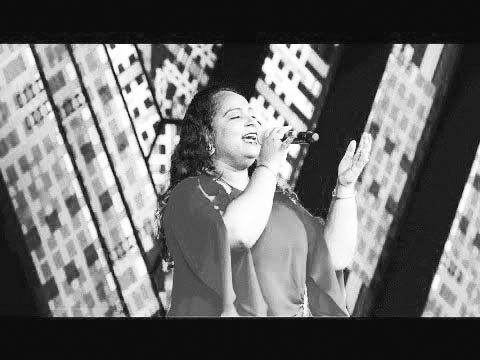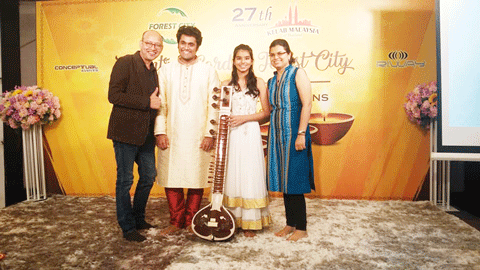PRODIGY: Anvita Shankar, who trained at Goa’s Kala Academy to play the sitar, recently performed with Anoushka Shankar (daughter of internationally famous sitar guru, the late Ravi Shankar) at a grand show in Dubai.
By Special Correspondent
DURING the Portuguese Colonial regime there were no facilities for education. There were no engineering colleges or polytechnics, no specialized institutions for training in management like the Goa Institute of Management. There were no industrial training institutes to equip young people with the skills they needed for getting jobs. The only choices were to work the family paddy fields or go to the Gulf and other countries to earn a living. Even for higher studies, the majority of the Goans went to Dharwad University in Karnataka to get their post-graduate degrees. The only institution which imparted skills that would guarantee a job were the church choirs of Goa.
Every church had a choir and most Goan homes insisted on imparting musical training to their children, especially to learn to play the piano, violin or other musical instruments like guitar, drums (the Goan drum ghumat), trumpet, etc. Interestingly, all our armed forces have their own bands. Perhaps the bands played a role in inspiring and motivating the soldiers and officers.
We know of many Goan musicians who were the heart and soul of church choirs. The initial source of capital for the Cosme Matias Menezes Group (CMM Group) were gold coins – which Pascoal Jose Menezes’ father, Cosme Matias Menezes, earned as a musician in the Portuguese army in Angola. Closer home we have Salvador Fernandes, the weighing machine king of Goa, whose father was part of the band of the British Army based in Pune. The father of Vincent Ramos, regional director of the Taj Group in Goa, was also a musician in the same band as Salvador Fernandes’ father.
LIVE ORCHESTRAS
IT is not widely known or now forgotten that before the Goan institutions stormed Bollywood, very few films had live orchestras. In the 70s and 80s the biggest names in western music were Chris Perry, his protégé Lorna and of course Braz Gonsalves who was a saxophone master. The most successful of the Goan musicians who took full advantage of the training they received in church choirs was Anthony Gonsalves. Unlike the others who played individual instruments, it was Anthony who introduced Hindi cinema to the music orchestras of Goa.
Anthony Gonsalves was a conductor whose baton could yield magic. The then famous music director team of Laxmikant-Pyarelal dedicated the song “My name is Anthony Gonsalves” to his guru, the Goan musician Anthony Gonslaves. Subsequently, Gonsalves went to the United States for a successful teaching stint. His daughter Laxmi Gonsalves was the sarpanch of Benaulim village for some time till she was disqualified — as she was an NRI.
Goa inherited some of the music traditions of Portugal, primarily the fado. It is best represented today by Sonia Sirsat who is popularly acknowledged as the fado queen of Goa and for many equal or better than the original fado queen of Portugal Amelia Fernandes.
AUGUST BRAGANZA
WHEN I first came to Goa there was an entertainment hub of live music at Arpora, which has now become the venue for the famous Friday Night Market. August Braganza had set up a music hub called the Haystack in the 80s which catered to people who loved live music. Some of the best musicians in Goa sang their hearts out at the Haystack. This included the young Remo Fernandes, Bondo who is a percussion expert, the Valadare sisters Ruth, Lucia and Jacinta and August himself who sang on our request many times in the old days when we listened to some music. .
Unfortunately, Haystack closed down and the only live music platform could no longer present music as in the real sense in which music lovers loved and wanted it. The trend right through the 80s and 90s was live music bands and singers in every entertainment restaurant and hotel. There were bands like Syndicate which had all the musical instruments, plus a vocalist.
The new hot spot for live music is Pentagon, a restaurant just outside the Majorda beach resort. It has patronized and offered a platform for live music presentations every night – it has become a restaurant venue as tempting for its food as its music bands and singers. Which some offered the treat of Margao-based singing cardiologist Dr Francisco Colaco, often accompanied by his wife Fernanda or daughter Elaine (a merchant banker working for Goldman & Sachs at one time, indeed, the entire Colaco family sings and we have heard them holding audiences spellbound).
REMEMBER HAYSTACK
THERE was also the famous Emiliano D’Cruz who had a style of his own. In those days, forget about Goa, all the live singers in hotels and restaurants in Bombay and Calcutta were musicians of Goan origin. Folk and country music such as the dances of the Gaudes and the Kunbis were kept alive by Timoteo Fernandes, who also performed at the memorable Haystack. Timoteo was also responsible for reviving the Carnaval in Goa after Liberation. In the first year 1963 Timoteo ensconced on a bullock cart declared himself King Momo.It was only subsequently that the government started taking the Carnaval seriously as world class tourist attraction and went all out to promote it.
Virtually every Catholic home in Goa has at least a grand piano. At one time there were several western classical music experts like Myra Shroff, remember her? There are many young Goan girls and a few men who trained to be classical musicians in Dona Paula and elsewhere in Goa. Many young Goan lasses have appeared and passed the exams conducted by Trinity College in London. Indeed, Patricia Rosario of Goan origin, heads one of the Trinity College departments and conducts concerts in collaboration with Victor Hugo’s heritage museum out down south Goa in Benaulim.

Among the pioneers of western classical music was Fr Lordino Baretto, who used to conduct western music classes at the St Thomas Chapel near the General Post Office at Fontainhas, now the heritage district of capital city Panaji. Goan Noel Flores was a member of the Vienna Orchestra, regrettably he passed on recently.
It is not only English light and classical music that originated from Goa to the rest of India. Never mind that melody queen, the late Lata Mangeshkar’s father Deenanath Mangeshkar, had migrated to Indore. So Lata was born in Indore. Her father would not tolerate the demeaning insinuations made against him by the upper caste Brahmins of Goa. A young Lata Mangeshkar remembered all this and rarely accepted invitations to visit Goa and the only time she attended a public function in Goa, was during the naming of the Kala Academy auditorium in memory of Deenanath Mangeshkar.
Hindi cinema music director Suresh Wadkar was part of the Azad Gomantak Dal. Lata Mangeshkar held a special concert in Pune to organize funds for the purchase of weapons to be used for liberating Goa, Diu and Nagar Haveli. The story goes that Wadkar carried his rifle in a piano. Many other singers like Jitendra Abhishek have a Goa connection.
SOURCE OF LIVELIHOOD
IN Goa itself, the flag of Konkani and Hindustani classical music is being nurtured and kept alive by Shakuntala Bharne of All India Radio. She herself is an outstanding singer and has organized many concerts in the state. You also have Pravin Gaonkar, who set up a Mangeshi music club and frequently holds concerts. Amongst the contemporary Goan singers is Hema Sardessai and who hasn’t her at some time or another.
Music has been a source of livelihood for many talented musicians both Hindu and Catholic. Kala Academy offers courses both in vocal and instrumental music. Anvita Shankar trained at the Kala Academy before becoming the only classical sitar player to grace A R Rahman’s orchestra. She recently performed for an international audience in Dubai with Anoushka Shankar, who as we mentioned before, is the daughter of the legendary musician Ravi Shankar and a musician in her own right.
Young Goans of both sexes should be made aware that music is a great source of employment, if you can make the cut. Among those who have made a major and lasting contribution to western classical music is BX Furtado, who set up a chain of outlets for musical instruments and also conducts training programs to prepare students for Trinity College exams.
